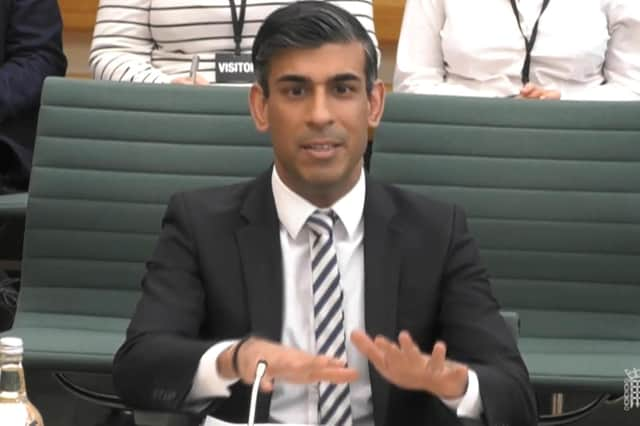Sunak warns against ‘irresponsible’ Government borrowing


Speaking to MPs yesterday, Richmond MP Mr Sunak said he was trying to get debt under control after huge increases during the coronavirus pandemic, and that “we need to be responsible with borrowing”, but he was accused of “plunging” more than a million more people into poverty.
His comments come as the Government’s promised energy strategy – which Prime Minister Boris Johnson promised would be unveiled within “days” earlier this month – is now not expected to arrive before the end of March.
Advertisement
Hide AdAdvertisement
Hide AdSpeaking to the Treasury Committee yesterday afternoon, Mr Sunak was told he had done “very little” for people who were struggling and out of work, but the Chancellor said it would have been “irresponsible” to have increased borrowing in last week’s economic update,
He later added: “There are choices. What I’m trying to balance between is what is a responsible amount of borrowing … and within that constraint how best to target the support.
“One may say if they don’t like my choices they would be happy to borrow a lot more, that’s just not something I think is responsible or sensible.
“I think it has the risk of stoking inflationary pressure and I don’t think it’s the right long-term thing to do for the country. I think we need to be responsible with borrowing, I think we need to be getting debt down and borrowing under control. Then there’s a choice about where to target that support. I appreciate that people might have wanted to do more on welfare, less to cut tax to people in work.”
Advertisement
Hide AdAdvertisement
Hide AdMr Sunak was also accused of “choosing” policies that will send more than a million more people into absolute poverty.
Labour MP Angela Eagle said the Chancellor had “made a political choice to plunge 1.3 million people including half a million children into absolute poverty”.
“On the figures we have now that is what you have chosen to do with your Spring Statement,” she added.
“What I’ve chosen to do is ameliorate on average a third of the impact on living standards from forces that are clearly outside of my control, global in nature,” Mr Sunak said.
Advertisement
Hide AdAdvertisement
Hide Ad“We’ve come up with a package that is progressive in the way it’s been designed and crucially will not add to the inflationary pressures in a significant way which would harm the very people we care about and want to make sure that we do care for, and have put in place specific support to help them.”
Measures announced to far in an attempt to reduce the impact of the cost of living crisis include a cut in fuel duty and a £150 council tax rebate for millions of households across the country.
However, prices are continuing to rise across the board, and many experts say intervention has gone nowhere near far enough, with gas and energy costs reaching new highs in the weeks since Russia has invaded Ukraine.
The energy price cap is set to increase by almost £700 at the end of this week, but there are fears bills could soar further still when the cap is reviewed again in the autumn.
Advertisement
Hide AdAdvertisement
Hide AdOfficials at the Office for Budget Responsibility, a Government-funded body who provide independent analysis of the nation’s finances, have said they are particularly concerned with inflation, which they now predict will hit at least 7.5 per cent by the autumn.
Budget Responsibility Committee member Professor David Miles said: “I suspect there will be very few people who don’t feel a very real cut in their standard of living.
“Inflation that we thought until recently would be three per cent or 3.5 per cent, is going to be 7.5 per cent.
“It could be nine per cent in the autumn.”